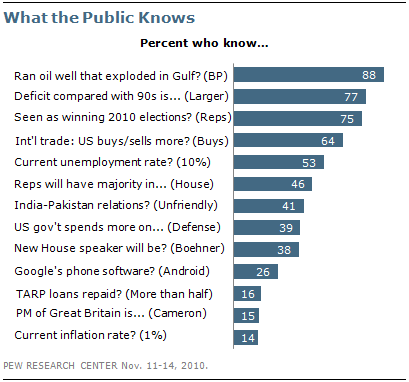
Cartoon Copyright ©2010 Adam Zyglis. Licensed via politicalcartoons.com.
Via TPM, the Republicans have made Ralph Hall (R-TX) House Science and Technology Committee chair. He's got an impressive record:
The Texas representative is a strong supporter of the oil and gas industry and has voiced his support for opening the Arctic National Wildlife Refuge to drilling. The League of Conservation Voters has given him a zero-percent rating every year since 2004 due to his positions and votes on environmental issues.
He's also the guy who killed a House bill which would have increased funding for scientific research and math and science education by forcing Democrats to vote in favor of federal employees viewing pornography. As ranking member, Hall introduced a motion to recommit which would have changed the bill by sending it back to the committee with mandatory instructions, in this case barring the federal government from paying the salaries of employees who had been disciplined for viewing pornography at work.
Some of you will have seen the story in The Atlantic this month outlining how American kids rank below-average on international math and science tests. Texas, were it a country (and why, oh why, didn't we just let them leave?), would be almost identical in the rankings as the U.S. as a whole in math, between Latvia and the Russian Federation. (Illinois is about the same, sadly.) The only state that breaks into the top 20 is Massachusetts, slightly ahead of Solvenia and slightly behind Austria.
It's an astute policy choice for the GOP. The 87-year-old Hall—he's the oldest member of Congress in either house—has strong ties to the oil industry and voted against NAFTA in 1996. I'd go on about his science and technology credentials but, sadly, I couldn't find any.
Yes, the GOP is all about policy these days. Chairman Hall will fit right in.
I've recently had the opportunity to work on-site with a client who has a strong interest in protecting its customers' privacy. They have understandably strict policies regarding who can see what network data, who can get what access to which applications, etc. And they're interested in the physical security of their buildings.
At some point, however, process can stymie progress, and this client recently added a physical security measure that can stand as a proxy for everything else about how they function. Not content with having a full-time security guard at each lobby entrance, and with doors that require an ID to open, they now have a man-trap-style revolving door system. Only one person can enter the door at a time, or alarms sound. The doors move slowly enough that even the slowest walkers—and this is far Suburbistan, so there are many—can get through without hurrying. And to make extra-special-certain, these doors require a second ID badge.
Now, the client building is 30 km from the nearest city of any size, and that city doesn't even rank in the top 50 by population. In order to get to the building you have to drive some distance from anyplace you'd ever want to be, then cross a parking lot whose area, according to Google Maps, is four times greater than the building's footprint. In other words, they're protecting the building from...nobody. Nobody will ever lay siege to this place.
This aptly demonstrates the philosophy throughout the organization: they have immense barriers that have no purpose except to prevent any actual work from happening. My effort for this particular client lasted several long weeks and produced, in the end, about fifteen lines of code. They brought 60 developers onto the project to speed it up, with the result that 60 developers tripped over procedures and project management at immense cost to the company to produce something four guys in a garage could have done in the same length of time.
There's a punchline, a poignant one for the day after Elizabeth Edwards died: the client is a major health-insurance company.
Do you want to know why the U.S. spends more on health care than any other country? I think I have the answer.
N.B.: The title of this post comes from one of my favorite quotes, usually ascribed to Napoleon Bonaparte but probably coined by Robert Heinlein: "Never attribute to malice that which is adequately explained by stupidity."
Via Sullivan, Salon presents four possible scenarios that could very well happen:
Despite the aura of omnipotence most empires project, a look at their history should remind us that they are fragile organisms. So delicate is their ecology of power that, when things start to go truly bad, empires regularly unravel with unholy speed: just a year for Portugal, two years for the Soviet Union, eight years for France, 11 years for the Ottomans, 17 years for Great Britain, and, in all likelihood, 22 years for the United States, counting from the crucial year 2003.
when Washington's global dominion finally ends, there will be painful daily reminders of what such a loss of power means for Americans in every walk of life. As a half-dozen European nations have discovered, imperial decline tends to have a remarkably demoralizing impact on a society, regularly bringing at least a generation of economic privation. As the economy cools, political temperatures rise, often sparking serious domestic unrest.
This will be interesting, anyway.
I've always thought Iowans were generally sensible and tolerant. Apparently not all of them:
Wow. (Hat tip TPM.)
Via Schneier, the Department of Homeland Security will soon get rid of color-coded warnings:
In an interview on “The Daily Show” last year, the homeland security chief, Janet Napolitano, said the department was “revisiting the whole issue of color codes and schemes as to whether, you know, these things really communicate anything to the American people any more.”
The answer, apparently, is no.
The Homeland Security Department said the colors would be replaced with a new system — recommendations are still under review — that should provide more clarity and guidance. The change was first reported by The Associated Press.
I wonder what that guy at O'Hare—the one who says "The current threat advisory level is orange" all day—I wonder what he'll do now?
Via TPM, this Duke project is cool:
This animated interpretation accentuates certain phenomena: the breadth and duration of support for Roosevelt, the shift from a Democratic to a Republican South, the move from an ostensibly east-west division to the contemporary coasts-versus-heartland division, and the stability of the latter.
More broadly, this video is a reminder that what constitutes “politics as usual” is always in flux, shifting sometimes abruptly. The landscape of American politics is constantly evolving, as members of the two great parties battle for electoral supremacy.
 Via Sullivan, the Pew Research Center recently published an alarming survey of Americans' grasp of current events:
Via Sullivan, the Pew Research Center recently published an alarming survey of Americans' grasp of current events:
Nearly eight-in-ten (77%) say correctly that the federal budget deficit is larger than it was in the 1990s and 64% know that in recent years the United States has bought more foreign goods than it has sold overseas. As in recent knowledge surveys, about half (53%) estimate the current unemployment rate at about 10%.
But the public continues to struggle with questions about the Troubled Asset Relief Program known as TARP: Just 16% say, correctly, that more than half of the loans made to banks under TARP have been paid back; an identical percentage says that none has been paid back. In Pew Research's previous knowledge survey in July, just 34% knew that the TARP was enacted under the Bush administration.
Some of these misconceptions might have something to do with Republicans lying about them, of course.
Because they write things that would never get past a typically-craven American news editor, like this:
Substantial rivals for [Rahm] Emanuel['s mayoral candidacy] are surprisingly few. Jesse Jackson junior, a congressman, says he will not run. He has been criticised for ties to a blonde and to Rod Blagojevich, the disgraced ex-governor, thankfully in separate incidents.
Via James Fallows. Simply put, our military occupation of Afghanistan—the police state we've imposed there—has limits on the indignities they'll inflict on the public:
A US Army staff sergeant, now serving in Afghanistan, writes about the new enhanced pat-down procedure from the TSA. Summary of his very powerful message: to avoid giving gross offense to the Afghan public, and to prevent the appearance of an uncontrolled security state, the US military forbids use on Afghan civilians of the very practices the TSA is now making routine for civilian travelers at US airports.
Everything about security involves a balance. "Perfect" security would mean complete controls on freedom, elimination of privacy, etc. Someone who is now exposed to real, daily danger in Afghanistan because of decisions about the proper balance argues that we need to be braver society-wide.
The soldier's note is worth reading.